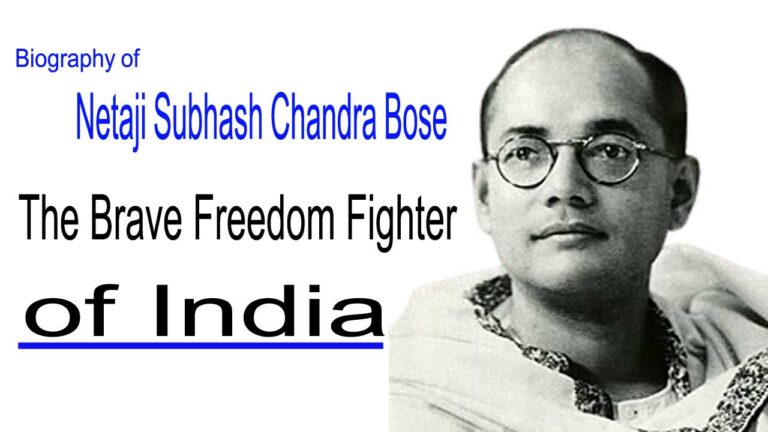Biography of Netaji Subhash Chandra Bose: Discover the inspiring life story of Netaji Subhash Chandra Bose, a prominent leader in India’s freedom struggle, founder of the Indian National Army, and a true patriot who fought for India’s independence. Learn about his early life, education, contributions, and mysterious disappearance.
Netaji Subhash Chandra Bose was a prominent Indian nationalist whose defiant patriotism made him a hero in India. He was a leader of radical youth in the Indian National Congress during the 1930s and later became a prominent figure in the Indian independence movement against British rule. He is best known for establishing the Indian National Army (INA) and his efforts to seek international support to liberate India from British domination.
Early Life and Education
Subhash Chandra Bose was born on January 23, 1897, in Cuttack, Orissa, into a well-off Bengali family. He was the ninth child of Janakinath Bose, a successful lawyer, and Prabhavati Devi. Bose was a brilliant student, and after completing his schooling at Ravenshaw Collegiate School, he pursued higher education at the University of Calcutta. Later, he went to England to prepare for the Indian Civil Services Examination, where he excelled by securing the fourth position.
Resignation from the Civil Service
Despite his success, Bose was deeply disturbed by the Jallianwala Bagh massacre and British rule’s oppressive policies. In 1921, he resigned from the Indian Civil Services, driven by his desire to join the freedom struggle and serve his nation. Bose believed that the British could only be expelled by force and began working towards that goal.
Political Career and the Indian National Congress
Bose joined the Indian National Congress and quickly rose through the ranks. He became a prominent leader in the Congress Party, known for his radical views and willingness to push for complete independence from British rule. In 1938, he was elected as the President of the Congress Party but resigned the following year due to ideological conflicts with Mahatma Gandhi and other Congress leaders who favored non-violent methods.
Formation of the Forward Bloc
After his resignation, Bose founded the Forward Bloc, a political group within the Indian National Congress that advocated for the immediate and complete independence of India. His growing discontent with the slow pace of the Congress’s actions led him to seek alternative ways to achieve freedom for India.
Escape from India and Formation of the Indian National Army
In 1941, Subhash Chandra Bose made a daring escape from British surveillance and traveled to Germany to seek assistance from the Axis powers in liberating India. However, when his efforts in Germany did not yield the expected results, he turned to Japan, which was actively expanding its reach in Southeast Asia.
In 1943, Bose took command of the Indian National Army (INA), which was initially formed by Indian prisoners of war in Japanese custody. Bose rallied thousands of Indians in Southeast Asia, inspiring them with his famous slogan, “Give me blood, and I will give you freedom.” Under his leadership, the INA fought alongside Japanese forces against the British in northeastern India, including battles in Imphal and Kohima.
Mystery of Disappearance and Legacy
In August 1945, Subhash Chandra Bose reportedly died in a plane crash in Taiwan, although many theories and rumors suggest that he survived and lived incognito for years. The mystery surrounding his death has never been conclusively resolved, and it continues to be a topic of speculation and intrigue.
Despite his controversial methods and alliances, Bose remains one of the most revered leaders in Indian history. His relentless pursuit of freedom, unwavering determination, and courage have made him a lasting symbol of patriotism and sacrifice. Today, his legacy lives on, inspiring generations to value independence and freedom.
Conclusion
Netaji Subhash Chandra Bose’s life is a testament to his unyielding commitment to India’s freedom. As a visionary leader, his efforts galvanized millions of Indians to rise against colonial oppression. His name will forever be etched in history as one of India’s greatest freedom fighters who gave everything for his country.
Who was Netaji Subhash Chandra Bose?
Netaji Subhash Chandra Bose was an Indian nationalist leader, founder of the Indian National Army, and a key figure in the Indian independence movement. He is renowned for his radical approach to fighting British rule.
When and where was Subhash Chandra Bose born?
Subhash Chandra Bose was born on January 23, 1897, in Cuttack, Orissa, India.
What was the Indian National Army (INA)?
The Indian National Army was a military force formed by Indian nationalists during World War II with the aim of securing Indian independence from British rule, with support from Axis powers.
Why did Subhash Chandra Bose leave the Indian National Congress?
Subhash Chandra Bose left the Indian National Congress due to ideological differences with other leaders, especially regarding the methods to achieve independence. He advocated for direct action and complete independence, contrasting with the non-violent approach of leaders like Mahatma Gandhi.
How did Subhash Chandra Bose die?
Subhash Chandra Bose is believed to have died in a plane crash in Taiwan on August 18, 1945, although the exact circumstances of his death remain a subject of controversy and speculation.
What was Subhash Chandra Bose’s famous slogan?
Subhash Chandra Bose’s famous slogan was “Give me blood, and I will give you freedom,” which inspired many Indians to join the freedom struggle.
What is the legacy of Netaji Subhash Chandra Bose?
Netaji Subhash Chandra Bose is remembered as a brave freedom fighter who fought relentlessly for India’s independence. His legacy is celebrated with numerous monuments, institutions, and events in his honor across India.
